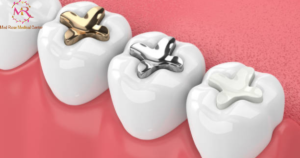They are single or combined materials of metal, plastic, glass, or other materials used to repair or restore teeth. One of the most common uses of dental filling is for dentists to “fill” cavities in the teeth. They are also used to replace cracked or broken teeth or teeth that have been accidentally worn off (for example, by biting or grinding the nails).
Materials
Today, several dental filling materials are available. Teeth can be filled with a tooth-colored plastic or material called gold, porcelain, silver amalgam (a mixture of mercury and silver, tin, zinc, and copper), or composite resin. There is also a material called glass ionomer that contains glass particles. This material is used in a similar way to composite resin materials.
Procedures
Before starting the procedure, dentists numb the gums around the affected tooth with injections of a local anesthetic. If the injured part becomes numb, the teeth are tested. This is determined on the basis of the amount of caries and damage.
If a tooth is decayed, the affected part of the tooth is removed, the tooth is washed, and the tooth is dried. Then the restoring material is placed where it is diseased, and the tooth is reshaped. The person is then encouraged to bite and feel the difference.
Risks and complications
For a few days after the restoration, the affected teeth may become numb and sore when chewing, especially if the food is hot or cold.
– May be allergic to the material of the stuffing and cause itching and rash.
– The insertion of stuffing can damage the nerve of the tooth.
– There is a small risk of infection at the injection site and procedure site.

Counseling and Treatment plans
The first step of the procedure is to examine your teeth to determine what is best for you. Dentists can inspect teeth with dental probes or cavities to examine the affected area. Doctors may also do x-rays to better understand the location and extent of the cavities.
There are several options for materials that are good for filling to seal cavities and prevent further damage to teeth from decay. For example, direct composite bonding, porcelain, glass ionomer, silver amalgam, gold inlay, etc. The materials used for stuffing are varied.
Follow-up
After the procedure, it is important for dentists to spend some time with the person discussing how to prevent cavities under or near the restoration. These measures can also help prevent tooth decay in other teeth.
Patients should be advised to practice good dental care, such as brushing their teeth with fluoride toothpaste twice a day, flossing, and daily use of an interdental cleaner. Fluoride rinses are also useful for patients who are at high risk of further tooth decay. People may need to make an appointment to wait to see how their teeth are processing or to have a regular professional cleaning.
Looking for expert dental care in Al Barsha Heights, Tecom, Dubai?
Contact us at 055-263-3890 to schedule your consultation for professional teeth filling services. Our skilled team provides personalized treatments to restore your teeth and enhance your dental health. Achieve a beautifully restored smile with our expert care.
Doctor of Medicine, Constantine University, Algeria
Diploma in Dermatology, Plymouth University, UK
Certified from the American Academy for Anti-Ageing and Aesthetic Medicine:
Lasers, Advanced Injectables, Threads ,Chemical Peeling
